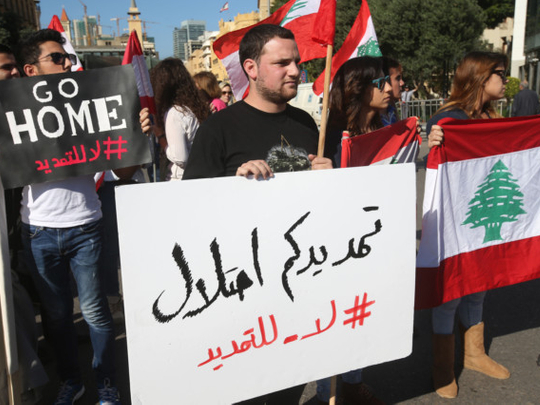
Beirut: Six months after President Michel Sulaiman completed his 6-year term of office, Lebanon is still without a head-of-state, with no sign that the political deadlock will end anytime soon.
This is not something new for the tiny Mediterranean country. Both former prime ministers Salim Al Hoss and Fouad Siniora became acting presidents because parliamentarians could not agree on successors to Amine Gemayel in 1988 and Emile Lahoud in 2007. Currently, Prime Minister Tamam Salam has found himself in the same boat since Michel Sulaiman’s presidential term ended in May of this year.
For Walid Baaklini, a Bzebdine resident in the predominantly Christian area of Metn, the “process has turned into a farce”. He blamed both presidential hopefuls Michel Aoun and Samir Geagea for contributing to existing divisions between the two main rival political coalitions March 8 and March 14.
“Both want to be president but we don’t want either of them,” he said.
For Beirut resident Antoine Haddad, March 8 never wanted to elect a successor to Sulaiman in the first place, as they worry that any candidate who reaches the palace no matter their political loyalties will eventually have to confront Hezbollah’s actions, which March 8 is trying to avoid.
Eyad Al Rayyes disagrees. He says that March 8 saved the presidency from a “convicted criminal” in a reference to Geagea and that parliament speaker Nabi Berri was entirely justified to conclude that no breakthrough was possible before early next year.
The media in Lebanon has capitalised on the chaos, filling the airwaves with political pundits speculating on who will end up as president and assigning blame to opposing political parties for the deadlock. Many television prognosticators like Michel Hayek and Laila Abdul Latif have transformed these predictions into an art form--or at least a lucrative business---linking the serious issue of electing a president to regional developments.
Further complicating matters, alert observers and commentators have linked Lebanon’s political climate to the outcome of US-Iranian nuclear negotiations, positing that a successful deal would bode well for Lebanon, as one of its most powerful political factions, Hezbollah, is largely financed and guided by Iran.
In fact, the latest extension of parliament’s term--two years and seven months--meant that deputies elected in 2009 would presumably legislate until 2017, which, without a president, would not be able to pass any legislation that, observers asserted, was what Hezbollah wanted in the first place. The Lebanese people would, as usual, be the biggest losers of such political stagnation since passing laws would be effectively impossible without prior ‘arrangements’. Even application of laws currently on the books is difficult because of political regulations imposed on the cabinet.
For nearly a decade now, the government’s hands have been repeatedly tied because of its mandate for absolute majority where any minister or group of ministers could block a particular programme.
While the cabinet holds real power, the ministers are often blamed for placing their allegiance to their political factions before the needs of the people. Rather than being a genuine balance of power many viewed the system as a balance of ‘terror’.
As a case in point, the most recent food contamination scandal illustrated the dilemma, which surprised few citizens. “Health Minister Abu Faour is courageous to identify and shame restaurant owners who serve rotten food, but the government doesn’t provide necessary electricity to keep refrigerators running so the food does not spoil!,” Haddad said, pointing out the irony.
Likewise, when torrential rains hit the country over the past few days, Lebanese had no expectations that the government would do anything about it and thus carried on with their lives by making due.
Sarkis, a food merchant in Bourj Hammoud, a predominantly Armenian suburb of Beirut, summarised the dilemma well.
“We are a people alienated from our leaders. We are all alone. Not a single member of parliament represents anyone except themselves,” he said.












